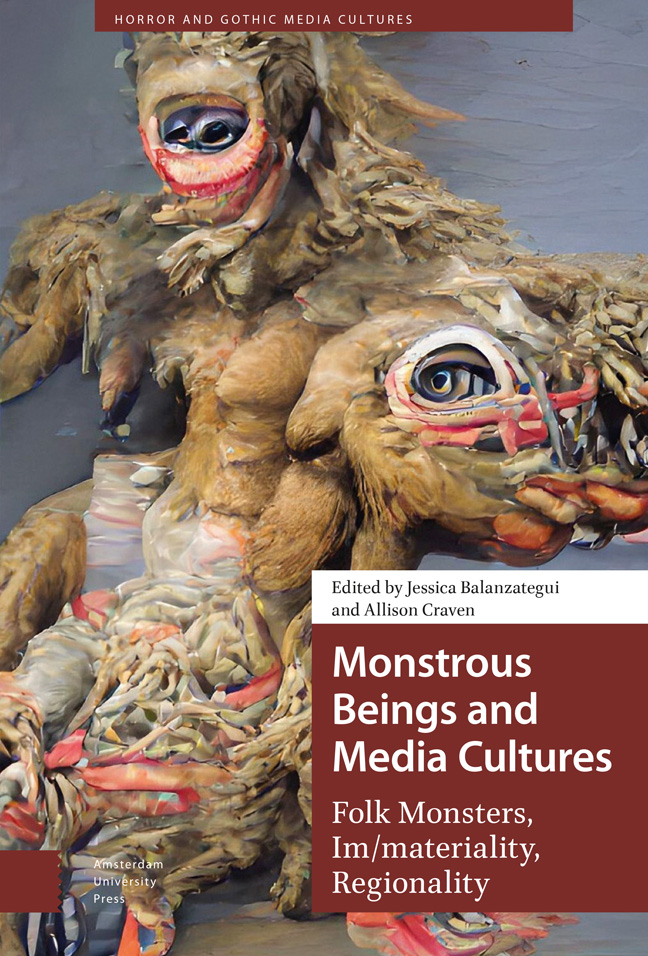Book contents
- Frontmatter
- Contents
- List of Figures
- Acknowledgements
- Introduction: Folk Monsters and Monstrous Media: The Im/materialties, Modalities, and Regionalities of Being(s) Monstrous
- 1 The Momo Challenge as Urban Legend: Child and Adult Digital Cultures and the Global Mediated Unconscious
- 2 “Every Imaginable Invention of the Devil”: Summoning the Monstrous in Eurocentric Conceptions of Voodoo
- 3 The Forest and the Trees: The “Woods” as Intersection between Documentary, Fairy Tale, and Internet Legend in Beware the Slenderman
- 4 Mark Duplass as Mumblegore Serial Killer: Fictional Vernacular Filmmaking in the Creep Series
- 5 Monsters in the Forest: “Little Red Riding Hood” Crimes and Ecologies of the Real and Fantastic
- 6 A Mother's Milk: Motherhood, Trauma, and Monstrous Children in Folk Horror
- 7 Documenting the Unheard: The Poetics of Listening and Empathy in The Family
- 8 Reimagining the Pontianak Myth in Malaysian Folk Horror: Flexible Tradition, Cinema, and Cultural Memory
- 9 An Uncommon Ancestor: Monstrous Emanations and Australian Tales of the Bunyip
- 10 The Folk Horror “Feeling”: Monstrous Modalities and the Critical Occult
- Works Cited
- Mediagraphy
- Index
7 - Documenting the Unheard: The Poetics of Listening and Empathy in The Family
Published online by Cambridge University Press: 17 February 2024
- Frontmatter
- Contents
- List of Figures
- Acknowledgements
- Introduction: Folk Monsters and Monstrous Media: The Im/materialties, Modalities, and Regionalities of Being(s) Monstrous
- 1 The Momo Challenge as Urban Legend: Child and Adult Digital Cultures and the Global Mediated Unconscious
- 2 “Every Imaginable Invention of the Devil”: Summoning the Monstrous in Eurocentric Conceptions of Voodoo
- 3 The Forest and the Trees: The “Woods” as Intersection between Documentary, Fairy Tale, and Internet Legend in Beware the Slenderman
- 4 Mark Duplass as Mumblegore Serial Killer: Fictional Vernacular Filmmaking in the Creep Series
- 5 Monsters in the Forest: “Little Red Riding Hood” Crimes and Ecologies of the Real and Fantastic
- 6 A Mother's Milk: Motherhood, Trauma, and Monstrous Children in Folk Horror
- 7 Documenting the Unheard: The Poetics of Listening and Empathy in The Family
- 8 Reimagining the Pontianak Myth in Malaysian Folk Horror: Flexible Tradition, Cinema, and Cultural Memory
- 9 An Uncommon Ancestor: Monstrous Emanations and Australian Tales of the Bunyip
- 10 The Folk Horror “Feeling”: Monstrous Modalities and the Critical Occult
- Works Cited
- Mediagraphy
- Index
Summary
Abstract
This chapter examines how the Australian apocalyptic sect (known as either The Family, Santiniketan Park Association, or the Great White Brotherhood), whose motto was “unseen, unheard, unknown,” is represented in the feature documentary film The Family (Jones 2016) and subsequent ABC (Australian Broadcasting Corporation) three-part television series of the same title. By responding to concerns that Jones's documentary has an ambiguous approach to the claims raised by the cult's victims, this chapter highlights how tropes from folk horror shape the documentary's depiction of trauma and child abuse perpetrated by leaders of the cult. I argue that testing Bill Nichols's modes of documentary (mostly the poetic mode) against folk horror makes sense because (like the poetic mode of documentary) folk horror typically denies resolution and closure, which aligns with The Family's implication that survival is never free from the burden of trauma.
Keywords: Cult, wyrd, folk horror, rurality, documentary ethics, empathic filmmaking
I love children.
— Anne Hamilton-Byrne (in Jones 2016)—People have been used to thinking of evil as being ugly, whereas it's not. It looks beautiful, it can use everything, even love, to get power.
— Fran Parker (former child sect member, in Jones 2016)The Family is an Australian apocalyptic sect in Victoria with the motto “unseen, unheard, unknown” (Haworth 2016). Also dubbed the Santiniketan Park Association or the Great White Brotherhood, they are Australia's most infamous cult, in operation continuously from the 1960s until the present, albeit now in a somewhat redundant form (Northover 2019). This chapter examines how the cult is represented in Rosie Jones's documentary feature film The Family (Jones 2016) and the subsequent three-part ABC (Australian Broadcasting Corporation) television series of the same title. Both create a sense of identity that peculiarly resembles a criterion of the folk horror narrative. Although folk horror is usually fictional, it is a broad genre that spans multiple media forms, which is why it is interesting to consider its use in a non-fiction documentary film such as The Family. The documentary and subsequent book, The Family (Johnston and Jones 2017) – written by investigative journalist Chris Johnston and filmmaker Rosie Jones – contain interviews with several adults who were in the sect as children recounting their draconian childhood, abuse, and authoritarian daily schedule.
- Type
- Chapter
- Information
- Monstrous Beings and Media CulturesFolk Monsters, Im/materiality, Regionality, pp. 173 - 190Publisher: Amsterdam University PressPrint publication year: 2023



